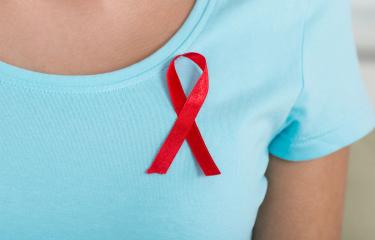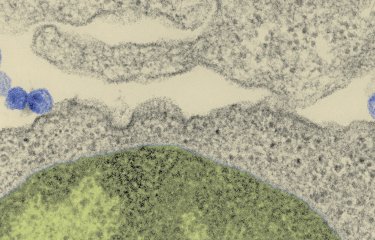Newly published scientific study describes 14 adult patients in long term functional remission of HIV seven years after being taken off early antiretroviral treatment. The Anrs EP 47`VISCONTI´ cohort confirms on a larger and durable scale what the Mississippi `functionally cured´ baby indicated – that early therapeutic intervention may be instrumental in HIV remission and has important implications for HIV cure research.
Press release
Paris, march 14, 2013

It is known that following acute infection, HIV establishes viral reservoirs in long-lived cells which allow its persistence even after prolonged treatment. As a consequence, viral replication readily restarts at pretreatment levels upon treatment interruption in most patients.
However, few patients treated very early in primary infection are able to control infection after treatment interruption. The initial observation of patients controlling HIV was made in France by Dr Laurent Hocqueloux (Orleans-La Source Hospital) and in the ANRS CO06 PRIMO cohort (this cohort is a long term survey of newly infected patients). The ANRS decided in 2009 to set-up and fund a multidisciplinary team of researchers and to assemble a cohort of such patients to characterize this phenomenon. The ANRS EP 47 VISCONTI cohort (Viro-Immunologic Sustained COntrol after Treatment Interruption) is a group of 14 patients who have maintained virological control of their HIV infection for a median time of 7.5 years after the interruption of antiretroviral therapy. All these patients were diagnosed during primary infection and were immediately treated (within ten weeks after infection) with antiretroviral drugs, for a median time of three years before treatment discontinuation. The ANRS EP 47 VISCONTI study is coordinated by Prof. Christine Rouzioux (Necker Hospital and University Paris Descartes, Paris), member of the initial team who identified HIV 30 years ago, and Dr. Asier Sáez-Cirión (Institut Pasteur, Paris), senior researcher in the lab of HIV co-discoverer and Nobel Prize Laureate Pr. Françoise Barré-Sinoussi.
There is an immensely valuable store of knowledge to be gained from analyzing the immunological and genetic characteristics for these patients. Preliminary data presented last year by Charline Bacchus (Pitié-Salpêtrière Hospital, Inserm Unit U945) at the XIXth International AIDS conference in Washington DC have shown that the ANRS EP 47 VISCONTI patients showed very low levels of HIV reservoirs, similar to those of natural HIV Controllers (patients who never received any treatment, remain asymptomatic and spontaneously control viral replication for many years)*. The results published in PloS Pathogens today show that the number of infected cells circulating in the blood of some of these “post-treatment controllers” keeps decreasing in the absence of treatment over the last four years. The shrinking of viral reservoirs while maintaining controlled viremia in these individuals closely match the definition of “functional” cure. Pr. Rouzioux explains “Early treatment in these patients may have limited the establishment of viral reservoirs, the extent of viral mutations and preserve immune responses. A combination of those may contribute to control infection in post-treatment controllers”.
A study presented at last week´s Conference on Retroviruses and Opportunistic Infections (CROI) in Atlanta showed that a baby infected with HIV in utero who was treated within 30 hours of birth and for 18 months had been able to control infection for 6 months.
“As in the case with the “Mississippi baby”, early treatment initiation does not allow us to evaluate whether the VISCONTI post-treatment controllers might have naturally achieved control of infection”, said Sáez-Cirión. “However, most of them do not exhibit the favorable genetic background found in natural HIV controllers and do not develop the same immune responses associated with control of infection in the latter. Moreover, whereas natural HIV controllers typically start controlling infection in primary infection, most post-treatment controllers were strongly symptomatic during this period, with levels of virus in the plasma high and similar to those of patients who will not control infection”.
Although most patients will not be able to control HIV, the data presented in the ANRS EP 47 VISCONTI and the Mississippi study strongly support early treatment initiation and may hold important clues for the development of a strategy to cure HIV or at least, induce a long-term control without the need of antiretroviral treatment. “Current efforts are focused in understanding why only a fraction of patients treated in primary infection are able to control infection and what are the mechanisms responsible for viral control in these post-treatment controllers. A European cohort constituted of Post-treatment Controller patients will start in the next few months, coordinated by the ANRS”, says Pr Jean-François Delfraissy, Director of the ANRS.
* See Anrs Press release Can early treatment of HIV infection give grounds for interruption of antiretroviral treatments, July 26th 2012
About the study
The ANRS EP47 VISCONTI study (Virological and Immunological Studies on CONtrollers after Treatment Interruption), is funded by the ANRS and promoted by Hôpital Orleans-La Source. It involves virologists, immunologists, epidemiologists and clinicians (Teams of Prof Christine Rouzioux (Necker Hospital, CNRS Unit EA3620, Université Paris Descartes), Dr. Asier Saez-Cirion and Dr Gianfranco Pancino (Institut Pasteur), Prof Brigitte Autran (Pitié-Salpêtrière Hospital, Inserm Unit U945), Dr Alain Venet (Faculté de médecine Paris-Sud, Inserm Unit 1012), Dominique Costagliola (UPMC, Inserm, CHU Pitié-Salpétrière), Laurence Meyer (Faculté de médecine Paris-Sud, Inserm Unit 1018), Cécile Goujard (CHU Kremlin-Bicetre) and Dr Laurent Hocqueloux (CHR Orléans)).
Sources
Post-treatment HIV-1 controllers with a long-term virological remission after the interruption of early initiated antiretroviral therapy. ANRS VISCONTI study, PLoS Pathogens, 2013.
doi. 10.1371/journal.ppat.1003211
Asier Sáez-Cirión (a), Charline Bacchus (b), Laurent Hocqueloux (c), Véronique Avettand-Fenoel (d,e), Isabelle Girault (f), Camille Lecuroux (f), Valerie Potard (g,h), Pierre Versmisse (a), Adeline Melard (d), Thierry Prazuck (c), Benjamin Descours (b), Julien Guergnon (b), Jean-Paul Viard (e,i), Faroudy Boufassa (j), Olivier Lambotte (f,k), Cécile Goujard (j,k), Laurence Meyer (j,l), Dominique Costagliola (g,h,m), Alain Venet (f), Gianfranco Pancino (a) , Brigitte Autran (b) and Christine Rouzioux (d,e) for the ANRS VISCONTI Study Group
(a) Institut Pasteur, Unité de Régulation des Infections Rétrovirales, Paris, France
(b) Université Pierre et Marie Curie, INSERM UMR-S 945 Immunité et Infection, Hôpital Pitié-Salpêtrière, Paris, France
(c) Centre Hospitalier Régional d’Orléans, Service des Maladies Infectieuses et Tropicales, Orléans, France
(d) AP-HP, CHU Necker-Enfants Malades, Laboratoire de Virologie, Paris, France
(e) EA 3620, Université Paris-Descartes, Sorbonne Paris Cité, Paris, France
(f) INSERM U1012, Université Paris-Sud 11, Le Kremlin Bicêtre, France
(g) UPMC Univ Paris 06, UMR_S 943, Paris, France
(h) INSERM, U943, Paris, France
(i) AP-HP, Hôtel-Dieu, Paris, France
(j) INSERM U1018, Université Paris-Sud 11, Le Kremlin Bicêtre, France
(k) AP-HP, Hôpital de Bicêtre, Service de Médecine Interne, Le Kremlin Bicêtre, France
(l) AP-HP, Hôpital de Bicêtre, Département d’épidémiologie, Le Kremlin Bicêtre, Franc
(m) AP-HP, Groupe hospitalier Pitié-Salpétrière, Service de Maladies Infectieuses et Tropicales, Paris, France.
Contact
Service de presse de l'Institut Pasteur
Nadine Peyrolo : + 33 (0)1 45 68 81 46
Marion Doucet : +33 (0)1 45 68 89 28
ANRS
Marie-Christine Simon : +33 (0)6 85 07 10 23




